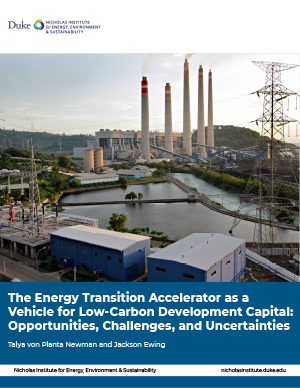Publications
Systems-Level Repurposing of Coal Assets: Insights from South Africa, India, and the United States
The global coal value chain is extensive and spans countries. Nearly 7,000 coal mines collectively produce over 8.5 billion tons of coal every year. More than 2,400 coal-fired power plants across the globe operate with a capacity of 2,175 GW. Then, there are numerous rail networks, trucks, and port terminals that constitute parts of the coal value chain. Yet in a net-zero world, this value chain will need to shrink rapidly, which could negatively impact the economies and communities that currently depend on it.
The Role of Clean Firm Power in a Reliable, Affordable, and Clean Electricity System in the Southeast
Since fall 2024, the Clean Air Task Force and Duke University’s Nicholas Institute for Energy, Environment & Sustainability have led in-person and virtual meetings and one-on-one dialogues with Southeastern energy and environmental regulators, utilities, consumer advocates, and businesses to discuss clean firm generation and how it could help meet electricity demand growth.
How DOE’s Proposed Large Load Interconnection Process Could Unlock the Benefits of Load Flexibility
In the United States, the current system for interconnecting large electric loads, like data centers, to the grid has left all sides frustrated. Data center developers are mired in slow interconnection processes. Meanwhile, electricity customers face rising rates and threats to grid reliability as the nation’s grid operators struggle to interconnect new power plants and batteries to the system quickly enough to meet rising demand. This brief outlines policy considerations for FERC to evaluate and highlights processes and mechanisms that grid operators would need to develop in order to maximize the benefits of load flexibility for electricity consumers. FERC has docketed the DOE Advanced Notice Of Proposed Rulemaking (RM26-4) and requested an initial round of comments by November 14, 2025, and reply comments by November 28, 2025. UPDATE: FERC has extended the initial comment period to November 21, 2025, with reply comments due by December 5, 2025.
Hyperscaler Data Center Buildout: A Sustainability Bane, Boon, or Both?
Hyperscalers are large-scale cloud computing providers that operate massive data centers to support global digital services. The rapid expansion of hyperscale data centers is driven by increasing demand for cloud computing, artificial intelligence, big data analytics, and digital transformation across industry and government. These data centers can provide services such as computing and storage at enterprise scale but consume large amounts of energy and water to do so, posing sustainability challenges.
The Energy Transition Accelerator as a Vehicle for Low-Carbon Development Capital: Opportunities, Challenges, and Uncertainties
Addressing the dual needs of development and decarbonization in low- and middle-income countries requires significant increases in public and private investment and project implementation. Announced in 2022 by the US Department of State, The Rockefeller Foundation, and the Bezos Earth Fund, the Energy Transition Accelerator (ETA) aims to drive such increases by leveraging carbon credits as a sector-wide channel for energy transition finance.
Congressional Testimony of Tyler H. Norris of Duke University—Hearing on Scaling for Growth: Meeting the Demand for Reliable, Affordable Electricity
Increased need for electricity is driving elevated demand for power companies to rapidly build out their generation capacity. But Nicholas Institute research shows that, with strategic timing of load use, such demand could be met by the existing power grid.
Utilities Need Regulatory Certainty
The Nicholas Institute's Tim Profeta contributed an essay to "How to Advance Environmental Protection During a Turbulent Era," a special section in the March/April issue of Environmental Forum. The Trump administration is expected to take up a deregulatory agenda—which environmentalists anticipate with trepidation but which businesses generally welcome as an appropriate relaxation of regulations they say inhibit a creative free market and stymie investments in needed projects.
Rethinking Load Growth: Assessing the Potential for Integration of Large Flexible Loads in US Power Systems
A key solution to the United States' soaring electrical demand—driven by unprecedented electricity needs from large commercial customers, particularly data centers and their booming artificial intelligence workloads—is load flexibility. This analysis provides a first-order estimate of the potential for accommodating such loads with minimal capacity expansion or impact on demand-supply balance.
Will Trump Mend or End Federal Methane Rules?
President Trump has promised to "unleash" American energy, and many expect his administration to roll back federal regulations on methane emissions. This paper examines whether the Trump administration and Congress will "mend" or "end" federal methane rules, including the Inflation Reduction Act Waste Emissions Charge (or IRA methane fee), Environmental Protection Agency (EPA) regulations, and new EPA reporting requirements.
Planning for Growing Electricity Demand During an Era of Uncertain Renewables and Climate Policy
Electricity demand growth has accelerated significantly, a trend that is expected to continue for at least the next 5 to 10 years and is driven by new technologies such as data centers and the expansion of the manufacturing and industrial base in the United States. This analysis uses a variety of integrated resource plans from utilities and other groups to estimate how overall electricity demand may change over the next decade in several scenarios.










